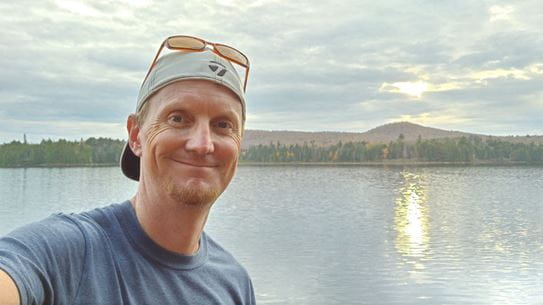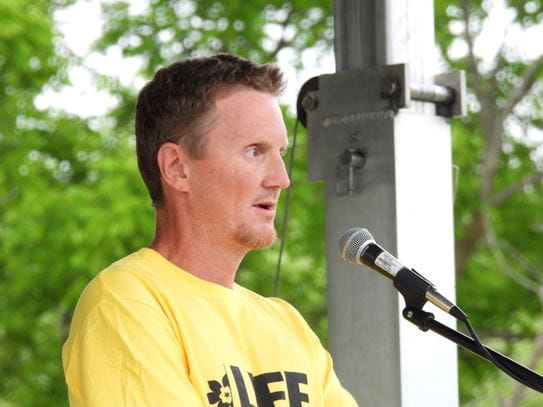Everything changed for Stephen Medhurst when he woke up with a sudden pain in his side in 2012.
After several tests and a hospital visit that lasted multiple days, nothing came back irregular except for a small mass. Stephen underwent surgery to remove the mass and had regular CT scans over the next two years, so they told him to return if he had any more pain or symptoms.
It wasn’t until years later, in 2019, that the pain returned. After another CT scan, it was revealed that the mass he had previously had doubled in size. Once again, Stephen had the tumour removed, as well as three feet of his small intestine, and went home to recover. Weeks later, he received a call from the hospital - he had stage 4 neuroendocrine tumours.
"I was in complete shock, of course, and I was at home alone at that time," Stephen says. "I didn't bother calling anyone, so I just went straight to the hospital like they instructed, where they told me that I had 10 to 15 years to live.
“It was a weird pill to swallow because you hear of people with cancer being told it's either treatable, and we can fix this, or you have months. The doctor was explaining how rare it was. His only reference was that it was the kind of cancer Steve Jobs had, and the only thing out of my mouth when he said that was, 'Well, didn't Steve Jobs die?' And he said, ‘Yeah, he passed.'"

Sharing his cancer experience with the world
A year went by; a year filled with appointments and injections to keep the cancer from progressing. Stephen started treatment right away and his doctor reexamined his earlier CT scans. Tumours were found in his lymph nodes, liver, lung, mesentery, bones, ribs, spine and abdominal walls. Stephen underwent more tests and doctors told him that all of these tumours were pre-existing, so his cancer was thankfully not progressing.
Stephen’s cancer was stable, but he still felt very tired. After he decided to stop working and focus on his treatment, Stephen started writing about his cancer experience in his blog Cancer Won’t Run My Life, where he continues writing to this day.
After starting his blog and writing about the ups and downs of his life with a cancer diagnosis, Stephen heard about the Canadian Cancer Society Relay For Life from his neighbours. Inspired by the stories he heard about the event, Stephen decided to participate in the virtual Relay in 2020.
"I needed an outlet and a way to process everything," Stephen says. "So, I did the Relay At Home that first year and raised quite a bit of money from my area, well over $7,000."
After being welcomed into Relay, Stephen continued to participate for three years. In 2023, Stephen was asked to be a Participant of Hope speaker at his community’s Relay event. He was a natural.
"I was a tradesman before my diagnosis, so I was never really one for talking," Stephen says. "But I do enjoy it now. It's amazing having people say they appreciate hearing my story. There's a message of hope behind it, too, and I think hope makes people think about what's important in life."
Stephen continues to speak publicly and blog, and still finds it incredibly emotional to be able share his story. But he still finds peace during the Luminary Ceremony, where participants remember their loved ones together at every Relay across the country.
"When the sun goes down, and you light the luminaries, I think that's what everyone waits for," Stephen says. "When you see all the bags lit on the hill, it's pretty powerful, everyone taking the time to honour somebody they've lost."
Stephen continues to live with cancer, sharing his experience on his blog and participating at the Relay event in his community.
"You have to have something in your life that makes living worthwhile. Even with cancer, you need a purpose; for me, it's sharing my story and my journey."
Move and be moved at Relay For Life this year
For over 20 years, Relay For Life has united a national community of people committed to providing support and hope to those living with and beyond cancer. With 2 in 5 Canadians expected to be diagnosed with cancer in their lifetime, signing up and fundraising for Relay is the most impactful way for you to support people affected by cancer.
Join your community’s Relay and support people like Stephen by funding life-saving cancer research and support services.
It takes a society to take on cancer.

